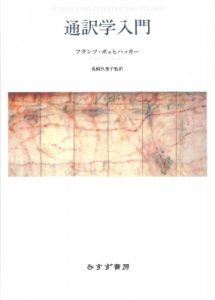これからの通訳を考える - Thinking about the future of interpretation
これからの通訳を考える
Thinking about the future of interpretation
今から日本語で書いた後、すぐに「逐次通訳」をする具合に同じ内容を英語でも書いていきます。通訳は「音声」を聞いて、音声を使う作業ですので、通訳ではなく、翻訳はもう少し時間をかけて文を考え整えていき、時には辞書を使って行いますから、そういう意味では翻訳ではありません。
I'll write in Japanese first, then put it into English as though I were doing "consecutive interpretation.” It is not interpretation; interpretation is the process of listening to and using sounds. It is not translation because translation allows me to spend more time considering and crafting sentences and occasionally use a dictionary.
通訳と翻訳は一般の人たちには同じように思われていますが、厳密に言えば、通訳と翻訳は別の仕事です。言語を「他の言語に変換する」という基本的な考え方は同じです。
Non-professional people assume that interpreting and translating are the same, but strictly speaking, they are two distinct professions. The fundamental concept of "converting a language” is the same.
英語では”interpret”も “translate”という言葉もどちらも同じ意味で使われることがありますが、日本語では、この2つはかなり峻別されてきました。 明治の近代化をはじめとする日本の歴史を振り返ると、翻訳は日本の国民が外国の文明を知り、吸収する手段として重要な役割を果たしており、その重要性は古くから認識されていました。
The words "translate" and "interpret" can occasionally be used interchangeably in English, but they have very different meanings in Japanese. Looking back on Japanese history, including the modernization of the Meiji era, it is clear that translation played a significant role in helping the Japanese learn about and embrace foreign cultures. Such significance has long been recognized.
しかし、日本人の話し言葉に対する一般的な認識は、「口は災いの元」、「沈黙は金」という価値観に支配されているように思われます。江戸時代のオランダ語通訳者について記した文献をみれば、当時の通訳者 (通詞) はオランダ語会話ができて、訳せる者、と考えられていたことがわかります。片桐一男さんが書かれた『江戸時代の通訳官』という本はなかなか示唆に富む本です。一読をお勧めします。
However, generally, Japanese people’s perception of the spoken language seems to be dominated by the values like "the mouth is the cause of all disasters" and "silence is golden.” literature describing the Japanese interpreters who spoke Dutch during the Edo period tells us that an interpreter at the time was thought to be someone who was able to have a conversation in Dutch and translate. "The Interpreters in the Edo Period," written by Kazuo Katagiri, is a very thought-provoking book. I'd suggest you take a read.

雄弁さよりも沈黙を重んじ、口は災いも招くと考える日本の文化の中で、「口」が生活の糧として重宝されたとは言い難いのです。このことは、通訳と翻訳に対する考え方の違いにも表れているように思えます。
It is difficult to assert that the "mouth" was respected as a source of livelihood in a Japanese culture that favors silence over eloquence and believes that the mouth might bring about disasters. This seems to be reflected in the different attitudes toward interpreting and translation.
通訳者は言語を操る特殊な存在である一方で、日本人の多くは、通訳は英語さえ上手に話せればできるものだと、いまだに思っています。しかも、言語を操る特殊な存在というと、どちらかというと機械的に言葉を変換する「自動装置」のようなものが想像されています。
While interpreters are special individuals who manipulate languages, many Japanese still believe that interpreting can be done as long as one speaks good English. Moreover, when people think of a special individual who manipulates languages, they imagine something more like an "automatic device" that mechanically converts words.
そのため、通訳をする際に背景知識が基本的に必要であることすら、一般の人には理解しにくいようです。同時に、「機械で通訳ができるのなら、英語を話せる人なら訳すくらいできるだろう」と考えるのも自然なことかもしれません。
Therefore, it seems hard for most people to even understand the fact that interpreting requires some background knowledge. And at the same time, thinking, "If a machine can interpret, then a person who speaks English can at least translate," might be natural.
こういう安易な考え方は、人間にとって言語とは何か、言語が内包する文化的な問題、コミュニケーションが内包する言語と文化の関係性についての深い理解が欠けています。その結果、言語と「コミュニケーション」を扱う職業としての通訳という仕事が理解されていないのです。
This simplistic way of thinking lacks a deep understanding of what language means to people, the cultural issues it raises, and the interplay between language and culture that communication entails. As a result, people are unaware that interpreting is a profession that deals with language and “communication.”
このような通訳観から生まれる問題は、日本における通訳訓練にも反映されています。ジュネーブに本部を置く国際会議通訳者協会(AIIC)は、世界の通訳者養成機関を3つのランクに分けて認定しています、しかし、大学院レベルの教育が前提なので、私の知る限り、日本の機関はリストには入っていません。
Interpreter training in Japan reflects the issues caused by this perspective on interpreting. As far as I'm aware, no Japanese institutions are on the list of interpretation training institutions that have been accredited by the Geneva-based International Association of Conference Interpreters (AIIC) because a graduate level of education is a prerequisite for its accreditation.
大学院レベルで通訳者を養成する欧米諸国と比べ、日本ではこれまで、主に民間の外国語学校や通訳学校で通訳訓練が行われてきました。これらの教育機関での訓練は、できるだけ早く訓練生を現場に出すことを目的とした実習が中心です。
In contrast to Western nations that provide graduate-level training for interpreters, interpreter education in Japan has been provided by private foreign-language and interpreting schools. These institutes focus heavily on practical training with the intention of getting students out in the field as quickly as possible.
そのため、20年ほど前は、大学の学部レベルでも通訳の授業があることに違和感があり、アカデミックな場にはふさわしくない、という反対意見があったほどです。文学部では翻訳論の講義を設けているところがありましたが、通訳は完全な技術訓練以上のものとは考えられておらず、研究・理論化に値する分野とはみなされていませんでした。
Consequently, some 20 years ago, there was an objection to universities offering interpreting courses, even at the undergraduate level, claiming that they were unfit for university education and had no place in an academic context. Despite the fact that some literature departments offered courses in translation theory, interpreting was only seen as thorough technical training and not as an academic field deserving of theoretical research.
しかし近年、認知科学の発展とともに、同時通訳のプロセスが活発な研究テーマとして取り上げられるようになりました。応用言語学や異文化コミュニケーション学の分野でも、海外では通訳・翻訳がユニークな研究領域として認識されています。
However, with the advancement of cognitive science in recent years, the process of simultaneous interpretation has emerged as an important research area. Interpretation and translation are acknowledged abroad as distinct academic subjects in the fields of applied linguistics and cross-cultural communication studies.
日本では、コミュニケーションに使える英語教育への強い要望から、学部レベルで通訳コースを持つ大学が近年増えてきています。
Due to the high demand for English education that can be applied to communication, a growing number of universities in Japan have recently been offering interpreting courses at the undergraduate level.
通訳は、高度な母国語能力、外国語能力、そして文化的背景を含めた幅広い教養が必要とされる職業です。今後、大学での学部・大学院教育の充実を図り、日本国内において、高度な訓練を受けたプロの通訳者や高度な知識を持つ通訳理論の研究者の育成が望まれます。
Interpreting is a job that requires a high level of native language skills, fluency in a foreign language, and wide knowledge, including experience with different cultures. To develop highly skilled professional interpreters and highly knowledgeable scholars of interpreting theory in Japan, it is envisaged that undergraduate and graduate education at universities will be improved in the future.
国境を越えて人や情報が行き交う21世紀の社会では、通訳の重要性はますます高まっていくでしょう。人間の要素が強い場面での交渉、対面でのコミュニケーションが強く求められる場面でのデリケートな折衝などでの通訳者の仕事は、機械では対応できない難しいものなのです。
In a 21st-century society where people and information travel across boundaries, interpreters will be more and more crucial. It is challenging and impossible for machines to handle the work of interpreters in negotiations with a strong human element and delicate negotiations where face-to-face contact is essential.
それでは、これからの通訳者の使命や規範は何なのでしょうか。インターネット上で無料の翻訳サービスが提供され、音声付き自動通訳装置もかなり実用化されてきました。機械が一定の範囲の情報を通訳し、通訳アプリが簡単な日常会話を多言語に通訳する時代です。
What will be the roles and expectations of interpreters in the future, then? The Internet offers free translating services, and voice-activated automatic interpreting systems are now incredibly useful. Today, machines can interpret a certain range of information, and interpreting applications can interpret ordinary daily conversations into a variety of languages.

そのような時代において、人間の通訳者の役割はどうなるのでしょうか。機械のように言葉を変換するだけの存在として通訳者はあり続けるのでしょうか。それとも異文化間の橋渡しや、時には文化の仲介者として積極的に介入していくことが使命になるのでしょうか。
What will the function of human interpreters be in such a time? Will interpreters still be used merely as automatic “word converters” in the future? Or will they be tasked with bridging cultural gaps and, on occasion, serve as active cultural mediators?
人間である通訳者だけができる通訳の利点とは何なのでしょうか。イクサス通訳スクールでは企業や省庁で通訳されている方たち、または大学で通訳学を学びさらに訓練を続けたい方たちが学ばれています。これをお読みの皆さんもぜひイクサスで学んでください。通訳教育に基づいた理論と実践によるレッスンをオンラインで学べるように提供しています。
What benefits of interpreting can only be provided by human interpreters? At our school, Ichthus Interpreting School, we teach students who are interpreting for businesses and ministries, as well as those who have studied interpreting at universities and are pursuing further training. We encourage you to join us. We provide theory- and practice-based online training based on interpreting educational theory.
推薦図書 Recommended Book

講師プロフィール
Jay H. Hirota
サンフランシスコ州立大学・同大学院(専攻・行動科学)
San Francisco State University
Monterey Institute of International Studies

